
|
March 22, 2012 - No. 40 Quebec Students Defend Their Rights and Quebec's Interests  Left: General Assembly at the University of Quebec in Trois-Rivière, March 14, 2012. Right: Demonstration in Shawinigan, March 14, 2012. (AmériqueQuébec) Quebec Concessions
Are
Not
Solutions
in
the
Forestry Industry Quebec Students Defend Their Rights and Quebec's InterestsThe Quebec students' determination to block the tuition fee increase is exposing the Jean Charest Liberal government. At a time when the movement has just passed an unprecedented 200,000 students on strike, the Premier downplayed this historic achievement, telling a gathering of Young Liberals on March 17 that, "Not all students support the strike movement." This is an absurd argument, especially since the government has been saying from the beginning that it will decide because it was elected. Perhaps this is a good time to remind Mr. Charest that not "all" Quebeckers elected him either! This government that has been dragging Quebec society backwards for the last 10 years was elected with the support of 23 per cent of electors in an electoral system based on disinformation and the marginalization of the fundamental problems in society. The students are entirely justified to fight for what could advance society. The students and their allies continued their actions
all weekend long.
On March 18, thousands of families responded to the students associations' calls and gave their support to the students against the tuition fee increase, holding demonstrations in Montreal, Quebec City, Sherbrooke and Alma. In Montreal, more than 30,000 people rallied in Lafontaine Park. Joining the families were students at all levels, including secondary school students who are preparing to take action this week, teachers, workers and many community groups. A mother in Montreal, Rachel Sarrasin, started a
Facebook group called Parents Against the Tuition Increase that already
has many members. "...[T]he movement doesn't just concern students.
It's
not correct to say that as parents, we must get involved because we
don't want to pay more when our kids go to university.
We're mobilizing because we want to contribute to a movement for a
society where education is a fundamental value," she said.      Sherbrooke, March 18, 2012 At the University of Montreal, there are now 52 students associations on strike, representing 16,761 students. More than a thousand of them held an action on March 14 on campus and then made their way to the offices of Education Minister Line Beauchamp. "The Minister is trying to be discreet, but we're holding her to account. We know she asked her colleague [Finance Minister Raymond] Bachand to thumb his nose at us in the budget, but she herself should bear the weight of her decisions," said Stéfanie Tougas, general secretary of the Federation of Students' Associations of University of Montreal Campus (FAECUM).
On March 16, the students in the health sector held an
action in front of Jean Charest's offices. "For years we have used
every platform to explain that the tuition increase is not viable,
neither socially nor economically. Today we denounce the impact of this
75 per cent increase in the health education sector.
It's well known that the more educated a society is, the healthier it
is," declared Léo Bureau-Blouin, president of the Federation of
Quebec College Students (FECQ). "Health students are already being strangled by the high cost of books and study materials. They must also take on more university administrative fees than other programs. If we want to preserve access to these programs to middle class and low income families, the government must renounce this tuition fee increase," added Martine Desjardins, president of the Quebec Federation of University Students (FEUQ). Jeanne Reynolds, spokesperson for the Broad Coalition of Student Union Solidarity (CLASSE) said that she sees in this vast movement a desire to participate in the direction of society. "It's the entire vision of education that's changing. That's why people are mobilizing. People want something that represents them." Régine Laurent, President of the
Fédération interprofessionelle de la santé (FIQ),
reiterated the FIQ's support for the student movement against the
tuition fee increase. "The struggle the students are leading will have,
among others, direct consequences on accessibility. And among all the
determining factors for
the health of the people, access to education is the most important.
The advancement of a society and the improvement of the health of its
population are undeniably linked to the democratization of access to
education," she said.    At Concordia University, more than 30,000 students at all levels have joined the strike against the tuition increase. The graduate students are also denouncing other aspects of the Liberal government's plan to finance universities. "According to the plan's objectives, universities will have to increase their revenue from donors by 50 per cent from now until 2016-2017. Also, 10 to 20 per cent of their budget must be attributed to competitive placement, that is to say advertising," said Annie Lalancette, spokesperson for Concordia GEOGrads. "Rather than invest so much money in promoting Quebec universities to Canadian and foreign students, education and research should be funded, " she added. In many colleges and universities, the teachers held actions in support of the students. Among others, on Saturday, March 17, they proceeded to satirically inaugurate Voyageur Island, a $450 million housing project that has been abandoned. High school students have also gone into action, and this despite the many blocks from administrators. At Notre-Dame College in Montreal, wearing the red square has been banned because it goes against the dress code. Since the mass strikes of Quebec students in 2005, the red square has come to symbolize the Quebec student movement and comes from the expression "carrément dans la rouge," meaning "squarely in the red," a reference to students' indebtedness caused by the Charest government's attacks on funding for education. The board for the International School of the Patriots informed parents that "for reasons of neutrality in this debate of ideas," no demonstration of support for the movement is permitted. "No students are permitted to go to Montreal to demonstrate and no internal activities will be organized to promote the strike movement," wrote the principal, Marie-Claude Tardif.
Far from being intimidated, the youth are pursuing their actions for the right to education. On March 14, students from Sophie-Barat school demonstrated with strikers. At Paul Gérin-Lajoie school in Outremont (PGLO), the students voted 98 per cent in favour of a one-day strike to participate in the national demonstration on March 22. "High school youth are often neglected and underestimated. Our objective is to give a voice to these students. We want the government to know that it's our generation that will suffer the tuition increase," explained Alexandre Petitclerc, a grade 11 student at PGLO. Speaking to journalists, CLASSE spokesperson Gabriel Nadeau-Dubois said, "After March 22, the student movement will be at a crossroads. All possible ideas to make the Charest government fold will be discussed at a congress to be held the following weekend. March 22 is not the end. Unless the Liberal government surprises us, it will not back down," he added. Meanwhile in an interview on the talk show Tout le monde
en parle, Education Minister Line Beauchamp said that her
government
was there to take decisions and she repeated that her government's
decision was final. "This is not a negotiation. The decision has been
taken," she said. 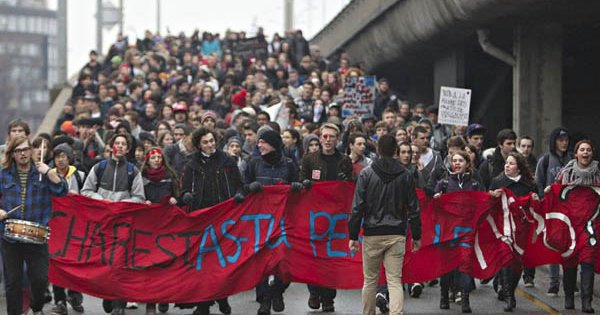   (Quartier Libre)
Concessions Are Not Solutions in the Forestry Industry No! to Legalized Theft of Pensions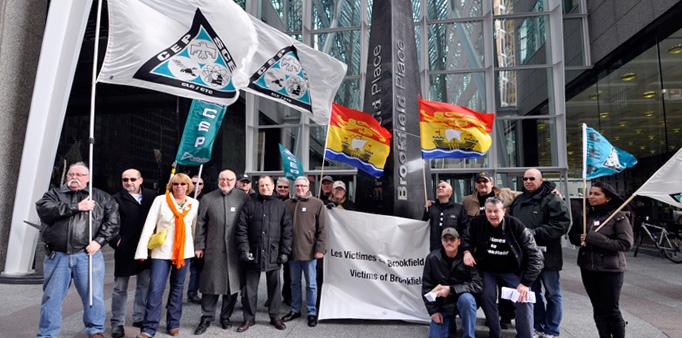 Members of Victims of Brookfield and the Communications, Energy and Paperworkers Union demonstrate against the theft of Fraser Paper retirees' pensions outside Brookfield offices in Toronto, February 20, 2012. (CEP) TML interviewed Maurice Lalonde, President of the Fraser Papers Retirees Association and Quebec spokesperson for the Victims of Brookfield. Formed in the fall of 2011, Victims of Brookfield represents former Fraser Papers workers in Quebec and New Brunswick who lost 40 per cent of their pensions during the company's fraudulent bankruptcy protection proceedings. The group takes its name from Brookfield Asset Management which controlled Fraser Papers and used the bankruptcy protection proceedings to restructure the company. This included reopening facilities under a new name, Twin Rivers, so as to free itself of pension obligations to its workers. The former Fraser Papers workers do not accept this legalized theft of their pensions and are leading actions to make their demands for justice heard. At the end of February, representatives of Victims of Brookfield from Quebec and New Brunswick held a demonstration in defence of their rights outside Brookfield's offices in Toronto. ***TML: Can you briefly explain the goals of the association and its work in Quebec at this time? Maurice Lalonde: We represent the Victims of Brookfield for all of Quebec -- everyone who has worked for Fraser Papers. The aim of the association is to help people recover at least some of what they lost following Fraser Papers' bankruptcy protection proceedings. One of our demands concerns the hydro-electric dams that Brookfield runs in the region. It manages four dams on the Rivière du Lièvre in the Outaouais Valley. Environment Minister Clement Gignac recently took the Jim-Gray dam in Saguenay-Lac-Saint-Jean away from Resolute Forest Products [because the company was shutting down production]. We want to examine things with Minister Gignac to see if there is a possibility to do something on the question of Brookfield's dams.
What these people have done is immoral and we want the government to apply the same formula as it did in Saguenay-Lac-Saint-Jean. Brookfield makes a substantial profit by selling electricity to Hydro-Quebec. It's difficult to get exact numbers, but we think Brookfield makes more than $50 million a year in profits with its dams. It has done the same thing in Berlin, New Hampshire. It closed the factory but kept the power plant. Moreover, it is largely because of profits from hydro-electricity that Brookfield remains Twin Rivers' largest shareholder. Twin Rivers' Edmunston pulp mill has a big cogeneration plant which produces energy that is sold very profitably to New Brunswick Energy. We want the government to take a measure similar to what it did when it reclaimed the Jim-Gray dam in Saguenay-Lac-Saint-Jean, or to impose a fee on the company, with the money paid directly into the pension funds until they are 100 per cent funded. TML: You recently filed a class action lawsuit. ML: Our
class action for Quebec was
filed on February 28 and our members from New Brunswick will file
theirs soon. For those of us in Quebec, the next step is to get a judge
to accept that our law suit constitutes a class action and that
everything is in proper shape. That should be
done by the end of March. We have chosen three people: a retiree, the
spouse of a beneficiary who is now deceased and an active worker at the
Thurso mill, now owned by Fortress Paper. These three people represent
the unionized retirees, as well as active union members who worked for
Fraser Papers for 15 to
20 years, lost 40 per cent of their pensions, and now work for
Fortress. In total, 578 people are represented in our class action. We
are demanding to be reimbursed for $12 million of the $24 million we
lost. Our class action is directed against two Brookfield
administrators for poor management of the pension funds
in the 2004-2009 period -- 2009 was when Brookfield was placed under
bankruptcy protection. In Quebec, you can't sue someone It must be understood that Fraser Papers didn't put any money in the pension funds when it took control of our factory in the early 2000s. Until 2002, the pension funds were 100 per cent funded. In 2003, Fraser Papers demanded and received from the government a five-year extension to make its payments into the funds, which was extended another five years in 2008. In 2009 the company was put under bankruptcy protection. This was bankruptcy it had planned. (Translated from original French by TML Daily) Resolute Forest Products Demands New Concessions from Amos Workers
***TML: Resolute's latest demand is a new blow for the Amos workers. Gilles Chapadeau: Yes, and it comes in the middle of the labour contract. Resolute is not openly talking about reopening the contract but that is what this means. The current contract was signed in 2010 and it included concessions of 17 per cent in wages and benefits. The Amos plant is an important economic asset because this region has been severely hit by the forestry crisis. Sawmills have closed. The closure of the Temlan beam plant meant 100 job losses. As well, our region has not really benefited from the mining boom. There are some mining projects in the works but the main feature of the situation in Amos is the deep impact of the forestry crisis. For Amos and the region, the newsprint plant workers are very important. Resolute keeps attacking the workers rather than looking for solutions to the problems we are facing. If the workers fight and say No! to this new round of concessions, Resolute will try to turn the people against them even though they have already made concessions and now it is up to Resolute to do its share. Workers want to keep their jobs and save the plant but it does not seem that Resolute is very keen to keep it open. Sometimes we wonder if it is just looking for an excuse to close it. We feel like a pawn in Resolute's chess game. Resolute is using the crisis to actually force people to their knees. This is totally unacceptable. TML: In your comments to the press, you blame RFP for its lack of vision and its constant attacks on the workers. GC: According to us, there is another way to sort out the problems. Resolute wants to lower its costs of production but it is not going to lower them to a competitive level if it does not invest money, for example, in reducing its energy costs. There was talk of a co-generator and a steam recuperator but nothing has materialized. This would have gone a long way to lower the cost of energy which are a big chunk of the production costs. The main thing is that this investment would extend the life of the plant.
People are really getting fed up. Even the Mayor of Amos is fed up and in a comment he made to Abitibi Express, the local paper, he supports the workers. Municipalities are bleeding because they are trying to lower the taxes of these big corporations but they are not receiving anything in return. TML: In a comment to the press you say that the whole region has to mobilize itself against this attack. GC: It is a regional problem because we are fighting for jobs that do secondary and tertiary processing of the wood. That is what we do in Amos. We make newsprint out of the chips we get from the sawmills. There is only one newsprint plant in the region. We are proud of it and we must organize to keep it open. The facility is connected with the region because the chips come not only from Amos but from other cities like Comtois and Senneterre. If the plant closes, this will mean that the chips travel south which makes no sense. The logic is that the processing should be done as close as possible to the resource. We have seen regional mobilizations elsewhere in Quebec. When people stand together the government has to give some thought to what is going on and the same applies to the company. We cannot say that this is a labour dispute. There is no labour dispute. When the workers agreed to the first round of concessions they hoped it would save the plant and help the economy of the region. The company is now asking for another round of concessions but is offering no guarantee whatsoever that the plant will remain open. We want to mobilize the people of the region to show our concern for this facility which is an important economic asset for Amos and the whole region. (Translated from original French by TML Daily) Pharmaceutical Industry Predatory Monopolies and Absence of Government Defence of the PeopleThe disturbing case of OxyContin and the issue of nation-building
Derek Boogaard's death was followed with the suicide of Rick Rypien of the Vancouver Canucks and the unexplained asphyxiation but suspected suicide of recently retired hockey player Wade Belak. All three players were known as bare-knuckle fighters who suffered significant injuries during their careers. A graphic description of Boogaard's final hockey fight, where he received a severe concussion can be read in his Wikipedia biography.[1] The Battle for Public MedicineApart from hockey, life itself often results in injury at work and play and debilitating pain. Many illnesses, especially cancer, produce insufferable pain. How humans respond to this reality of pain to lessen or relieve its occurrence or more importantly deal with the source, is an important political, economic, social and medical issue. Canadians live within the modern reality of an interconnected society where our collective strength as a people gives us great capacity to defend ourselves from pain and other problems. To express that collective strength and channel it to benefit public interest, the people must exercise control over all aspects of the medical system. However, the building of public medicine in defence of the public interest comes into sharp contradiction with the private interests of the global monopolies and their representatives.
Without actively taking measures to defend the nation's public institutions and people from monopoly predators then public interest becomes overwhelmed, institutions are privatized or turned into organizations that deliver the people to the monopolies and public assets stolen or destroyed. Such is the case with our medical system and governments accepting global monopoly control over Canada's pharmaceutical sector. The single greatest medical expenditure has become the cost of pharmaceuticals. "OxyContin Marketing Blamed for Addiction Epidemic" -- CBCIn Ontario alone, government figures indicate that 30,000 people had ongoing prescriptions for OxyContin in 2010. The problem with this particular drug and its cost had become so large that an exposure was inevitable. In response to a program on CBC's Fifth Estate detailing the prolific numbers of Canadians addicted to OxyContin, not just hockey players, the Ontario government lifted its public prescription funding for the drug while other jurisdictions reversed regulatory approval. In a follow-up to its Fifth Estate program, the CBC published an article March 9 called, "OxyContin marketing blamed for addiction epidemic." The beginning of the item made a subtle connection with the recent hockey deaths: "Powerful but misleading marketing that for years pushed the highly addictive painkiller OxyContin has left potentially tens of thousands of Canadians with the burden of addiction, critics claim. OxyContin helped transform the medical landscape after it was introduced in the late 1990s, touted by doctors and pitched as a less addictive alternative to other opioids." The article then says that recently, "Several provinces dropped OxyContin ... as a publicly funded medication and it vanished from shelves, the drug once praised as a blessing became a curse for some addicts.... To replace the drug, Purdue Pharma ... began manufacturing a new formulation called OxyNeo. The replacement pill can't be crushed or liquefied and has thus been promoted as less prone to abuse. There are otherwise no clinical differences between the two brand names." Purdue Pharma began selling OxyContin in Canada in 1996 and took in $3 million in that first year. Through an extensive sales campaign having representatives harass doctors, clinics and hospitals, and through excitedly positive "news" items in the media, sales in Canada of that one drug alone "rocketed to more than $240 million in 2010." Much of this amount leaves the economy and country to fill the coffers of U.S. monopoly predator Purdue Pharma. Aside from the issue of pharmaceutical misuse and the block this can generate to the development of medical science generally, such a drain on Canada's wealth for a product that health care workers within the public medical system could easily manufacture and distribute is socially irresponsible and unsustainable. To muddy the waters of social responsibility, the CBC targeted doctors as the problem. The CBC item says, "Dr. John Craven, who runs a methadone clinic, blamed what he sees as an escalating addiction epidemic on irresponsible doctors who bought into the multimillion-dollar pharmaceutical sales campaign. 'I think it's been reckless prescribing,' Craven said. 'I think they've forged ahead with complete and reckless disregard for the safety and vulnerability of the people in our communities.'" Nowhere did the CBC identify the key issue of the absence of government and people's control of their medical system and lack of defence of the public interest against attacks from monopoly predators and their private interests. On the medical, as well as other fronts, governments refuse to move nation-building into the 21st century with measures such as the creation of a comprehensive public medical system to serve the public good. Such a system would entail the manufacturing of supplies and pharmaceuticals, construction of hospitals and other facilities, preventive medicine and delivery of health care within all workplaces, educational institutions and neighbourhoods, as well as post treatment care, seniors' care and the advancement of medical science through our own efforts and growing understanding.
CBC, which itself is supposedly a public nation-building institution, refuses to acknowledge that government is the only body powerful enough to restrict the predatory monopolies. Without government intervention in defence of the people and public interest, the monopolies run amuck not only stealing social product but also corrupting and turning into hucksters many who are exposed to them including medical practitioners. Without nation-building in defence of the rights of all and the people's well-being, without control firmly in the people's hands through public institutions, everyone is vulnerable in the face of the predatory monopolies and disasters are an inevitable side-effect. In the case of OxyContin, it is not as if Canadian governments at all levels were not warned of Purdue Pharma's corrupt practices. CBC reports, "In 2007, three executives with the American branch of Purdue Pharma pleaded guilty in a U.S. federal court to misleading regulators and an unsuspecting public about risk of addiction to OxyContin. The firm agreed to pay more than $600 million in civil and criminal fines." In the 21st Century the Working Class Must Build the NationNeoliberal governments are not interested in nation-building but rather in serving global monopolies. Why else would they be weakening the public medical system instead of strengthening it? Pharmaceutical costs alone are unsustainable but governments refuse to build a public drug industry; they do not even support a Canadian private generic drug industry. Neoliberals consider the survival or not of Canadian manufacturing as the prerogative of the global monopolies and beyond people's control and their power to decide. A supporter of CPC(M-L) made the following comment with regard to this problem of pain, addiction and privatization: "With private practice being pushed in health care, what we will see is an increased willingness (if that is possible) of doctors having patients on pills continuously for no other reason than the patient has to keep coming back for refills. That means the clinic swipes your health card for a $35 payment and the doctor takes one minute to see the patient and write another prescription. Not to mention what private clinics and doctors receive from the pharma-industry for prescribing their drug. It seems so innocent; the patient is in pain or has an illness, we give a pill; the patient feels less pain and/or it covers up the symptoms. Besides 'abuse,' what's the problem?" The CBC item concludes, "Addiction clinics are expecting an influx of visitors seeking help as OxyContin supplies disappear from pharmacies. Last week, Toronto Public Health officials recorded a threefold spike in demand for methadone treatments. The Fifth Estate contacted Purdue Pharma for an interview but only received a written statement that said all the company's sales activities in Canada complied with government regulations." The denial of nation-building and the handing of the country over to the global monopolies result in a litany of socially irresponsible activities just on this one medical front alone: OxyContin is hailed as a miracle drug for pain; Purdue Pharma is allowed open season on Canadians including their public pharmaceutical plans; Canadians are considered incompetent and unable to develop their own pharmaceutical industry even though the heritage of internationally famous laboratories says otherwise; addiction to OxyContin and costs skyrocket leading to panic and sudden removal of public payment and eventual delisting of the drug and its disappearance from pharmacies; tens of thousands of Canadians are left to fend for themselves to deal with their pain and addiction; anecdotes abound of suffering. The CBC writes: "Cancer patients and others suffering from chronic pain considered the pill -- twice as strong as morphine -- to be a godsend. Unknown to some doctors and pharmacists when OxyContin debuted were its extremely addictive properties, a fact that may have contributed to it becoming an international best-selling painkiller. "Marty Whittaker, who broke her back water-skiing 12 years ago, is among 30,000 people in Ontario whose OxyContin prescriptions will soon run out because of the province's decision to stop covering the drug in its public plan. Now she's bracing for a painful adjustment to a world without a pill she's grown dependent on. 'It's the only medication -- oral medication -- that we've tried that deals effectively with my pain,' Whittaker said. 'I'm as dependent on OxyContin as I am on my glasses to see.' "Tammy Dagnell, who started taking OxyContin for chronic pain in 1997, knows how hard it is to quit. She's been trying to kick the habit for years. 'When you run out, you'll do anything because that sickness -- you can't compare it to even the worst flu you've had,' she said. 'It's an absolute addiction, of course, but the chemistry in OxyContin, it does help your pain.'" The Necessity of a Powerful and Effective Workers' Opposition
Canada's present governments are handing over all the assets of the country and, most importantly, the decision-making power to the global monopolies. This must not pass. To be effective in defending themselves where Canadians work, in their localities and nationally, the people must empower themselves and gain control of the direction of political, economic, social and cultural affairs. If the people do not have control over their lives and it resides in the hands of the global monopolies and their political representatives any talk of defending the people and nation-building becomes meaningless and diffuse. The Workers' Opposition must become effective and powerful enough to hold governments to account to defend the rights of all and provide a guarantee of the claims of the working class on the economy and society. Note 1. http://en.wikipedia.org/wiki/Derek_Boogaard.
Read The Marxist-Leninist
Daily |


 The Mobilization Movement of Music Students (MMEM) held
a musical marathon March 16 and 17. The MMEM considers that given the
clear lines uniting education and culture, the $1,625 tuition increase
and its important impact on education's accessibility will inevitably
cause a cultural decline. "A music
degree -- or arts degree in general -- has no guarantee of lucrative
employment. Knowing that in Quebec, the average artist's revenue is 25
per cent less than the average of other workers, we find it pertinent
to ask the following questions: who would be able to study music when
the debt from these studies would
become insurmountable? What importance do we give to culture? Do
we want only the richest to pursue the arts, while the less well off
are forced to limit themselves to only the lucrative areas of study,
regardless of their passion and talent?"
The Mobilization Movement of Music Students (MMEM) held
a musical marathon March 16 and 17. The MMEM considers that given the
clear lines uniting education and culture, the $1,625 tuition increase
and its important impact on education's accessibility will inevitably
cause a cultural decline. "A music
degree -- or arts degree in general -- has no guarantee of lucrative
employment. Knowing that in Quebec, the average artist's revenue is 25
per cent less than the average of other workers, we find it pertinent
to ask the following questions: who would be able to study music when
the debt from these studies would
become insurmountable? What importance do we give to culture? Do
we want only the richest to pursue the arts, while the less well off
are forced to limit themselves to only the lucrative areas of study,
regardless of their passion and talent?"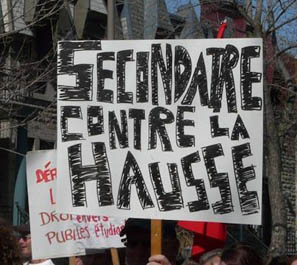 At Holy Name of Mary boarding
school, students who
joined the movement had their information kiosks banned from their
school. A student from André-Laurendeau school was suspended for
a day for distributing red squares.
At Holy Name of Mary boarding
school, students who
joined the movement had their information kiosks banned from their
school. A student from André-Laurendeau school was suspended for
a day for distributing red squares.
 We've said that the game
Brookfield plays everywhere is
to buy paper companies, close them down, then keep them strictly for
the hydro-electricity. That's what's happened to us. They picked up
four dams which were installed by the previous owner MacLaren. They let
everything else collapse and kept the
dams. At least one of these dams belongs to the Quebec government. The
turbines and equipment belong to Brookfield, but the dams themselves
belong to the government.
We've said that the game
Brookfield plays everywhere is
to buy paper companies, close them down, then keep them strictly for
the hydro-electricity. That's what's happened to us. They picked up
four dams which were installed by the previous owner MacLaren. They let
everything else collapse and kept the
dams. At least one of these dams belongs to the Quebec government. The
turbines and equipment belong to Brookfield, but the dams themselves
belong to the government. who's under
bankruptcy protection, except if you can prove negligence or fraud --
according to the experts we've consulted, this would lead to a
never-ending legal debate. So, our
class action concerns the period which precedes the time when Fraser
Papers went CCAA. We are holding a general assembly at the end of March
to inform our members of the state of affairs.
who's under
bankruptcy protection, except if you can prove negligence or fraud --
according to the experts we've consulted, this would lead to a
never-ending legal debate. So, our
class action concerns the period which precedes the time when Fraser
Papers went CCAA. We are holding a general assembly at the end of March
to inform our members of the state of affairs. At the beginning of March,
Resolute Forest Products
(RFP) demanded a new round of concessions from the workers at the Amos
newsprint plant in Quebec's Abitibi-Témiscamingue region. These
concessions represent a total wage cut of $2.6 million at this plant
where there are about 160 production workers
and a total of about 200 employees including office workers and
supervisors.
The plant underwent restructuring in 2009 and over 30 jobs were
eliminated. Then, in 2010, a concessionary contract was signed that
represented a cut of 17 per cent in wages and benefits. TML recently
spoke
with
Gilles
Chapadeau,
the
Quebec
Federation of Labour (FTQ) representative in
Abitibi-Témiscamingue, about the workers' response to these new
demands for concessions.
At the beginning of March,
Resolute Forest Products
(RFP) demanded a new round of concessions from the workers at the Amos
newsprint plant in Quebec's Abitibi-Témiscamingue region. These
concessions represent a total wage cut of $2.6 million at this plant
where there are about 160 production workers
and a total of about 200 employees including office workers and
supervisors.
The plant underwent restructuring in 2009 and over 30 jobs were
eliminated. Then, in 2010, a concessionary contract was signed that
represented a cut of 17 per cent in wages and benefits. TML recently
spoke
with
Gilles
Chapadeau,
the
Quebec
Federation of Labour (FTQ) representative in
Abitibi-Témiscamingue, about the workers' response to these new
demands for concessions. 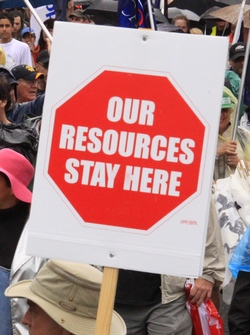 We are convinced that this
facility is profitable.
Whether it is competitive with other facilities of the same kind as it
is being run now is another issue. If the equipment is modernized at
another facility to reduce production costs, there is nothing we can do
unless the same thing is done here in the Amos plant.
The concessions Resolute is demanding from us amount to $2.6 million.
That is a lot of money for you and I but for the company that's just
small change. It is not how we are going to save the plant. We want to
participate in a project that will modernize the facility and make it
more profitable; we don't want to
take part in imposing new concessions on the workers.
We are convinced that this
facility is profitable.
Whether it is competitive with other facilities of the same kind as it
is being run now is another issue. If the equipment is modernized at
another facility to reduce production costs, there is nothing we can do
unless the same thing is done here in the Amos plant.
The concessions Resolute is demanding from us amount to $2.6 million.
That is a lot of money for you and I but for the company that's just
small change. It is not how we are going to save the plant. We want to
participate in a project that will modernize the facility and make it
more profitable; we don't want to
take part in imposing new concessions on the workers.  The 2011 autopsy of
Minnesota Wild and New York
Ranger hockey player Derek Boogaard from Saskatoon found OxyContin in
his system. OxyContin, manufactured by U.S. monopoly Purdue Pharma, is
a powerful narcotic twice as strong as morphine. Reliable sources
within professional hockey report
that players are routinely prescribed OxyContin or other narcotics to
relieve pain, and subsequent addiction is rampant. Intent to injure
is a tolerated if not openly accepted practice in professional hockey
and its feeder youth leagues so addiction to painkillers has a strong
material basis. Predatory pharmaceutical
monopolies and their legions of representative drug-pushers and
compliant governments and doctors complete the troubling reality.
The 2011 autopsy of
Minnesota Wild and New York
Ranger hockey player Derek Boogaard from Saskatoon found OxyContin in
his system. OxyContin, manufactured by U.S. monopoly Purdue Pharma, is
a powerful narcotic twice as strong as morphine. Reliable sources
within professional hockey report
that players are routinely prescribed OxyContin or other narcotics to
relieve pain, and subsequent addiction is rampant. Intent to injure
is a tolerated if not openly accepted practice in professional hockey
and its feeder youth leagues so addiction to painkillers has a strong
material basis. Predatory pharmaceutical
monopolies and their legions of representative drug-pushers and
compliant governments and doctors complete the troubling reality. Canadians have begun
rudimentary steps to build a public
medical system that protects one and all but those steps are constantly
under attack from the predatory monopolies both from within and outside
the system with pressure growing from private interests to take over
the complete delivery of health care.
The small steps forward in public health care form part of
nation-building. However, without breaking new ground and defending not
only what has been built but forging ahead to complete the process, for
example with a comprehensive public medical system available to all
that defends itself from the global
pharmaceutical predators, then retrogression will take the upper hand.
Canadians have begun
rudimentary steps to build a public
medical system that protects one and all but those steps are constantly
under attack from the predatory monopolies both from within and outside
the system with pressure growing from private interests to take over
the complete delivery of health care.
The small steps forward in public health care form part of
nation-building. However, without breaking new ground and defending not
only what has been built but forging ahead to complete the process, for
example with a comprehensive public medical system available to all
that defends itself from the global
pharmaceutical predators, then retrogression will take the upper hand.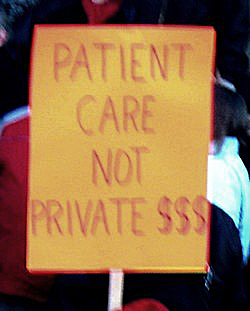 Without a determined
government defence of public
medicine and other public services, predatory monopolies are very adept
at turning every human necessity to their advantage and bleeding the
people dry. The for-profit private medical, educational and other
institutions at every level practice forms of societal
bloodletting.
Without a determined
government defence of public
medicine and other public services, predatory monopolies are very adept
at turning every human necessity to their advantage and bleeding the
people dry. The for-profit private medical, educational and other
institutions at every level practice forms of societal
bloodletting.